HRM and Global Business Environment Report: Unilever Case Study
VerifiedAdded on 2023/06/10
|10
|2942
|104
Report
AI Summary
This report provides a comprehensive analysis of Unilever's Human Resource Management (HRM) practices within the context of its global business environment, with a specific focus on its operations in Germany. The report begins with an overview of Unilever and its diverse product portfolio, followed by an examination of the influence of Germany's rules and regulations on Unilever's HR practices, utilizing a PESTLE analysis to assess political, economic, social, technological, legal, and environmental factors. It then delves into the performance management techniques employed by Unilever in both its home country (United Kingdom) and Germany, highlighting the differences and adaptations required for effective employee management in each location. Furthermore, the report identifies potential future issues and challenges in managing staff in Germany, such as communication barriers, attracting top talent, and adapting to the local environment. The report concludes with recommendations for Unilever to address these challenges and enhance its HRM strategies in the global arena. The report highlights the importance of adapting HRM practices to suit the specific needs and regulations of the host country, along with the importance of effective communication and talent acquisition strategies to ensure success in the international market.
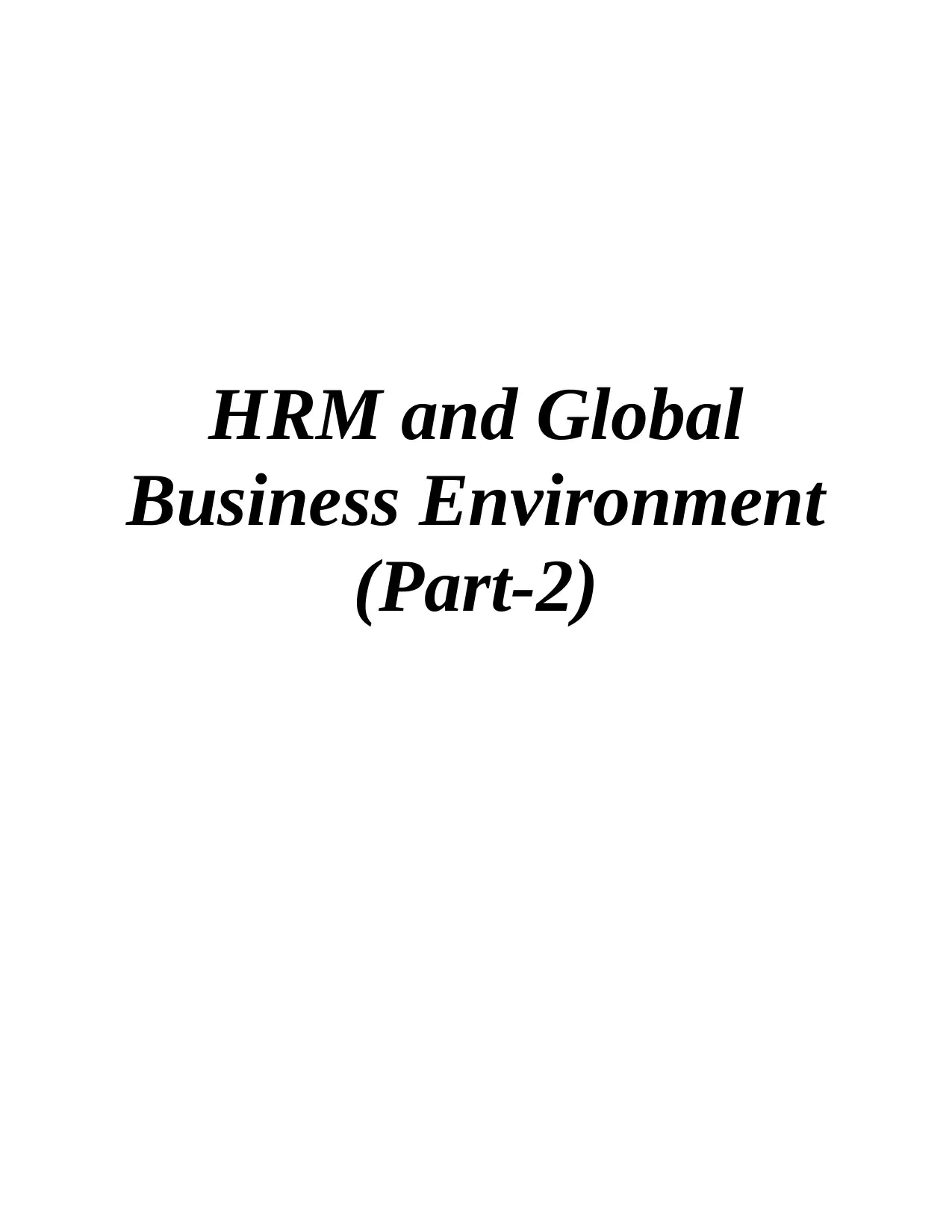
HRM and Global
Business Environment
(Part-2)
Business Environment
(Part-2)
Paraphrase This Document
Need a fresh take? Get an instant paraphrase of this document with our AI Paraphraser
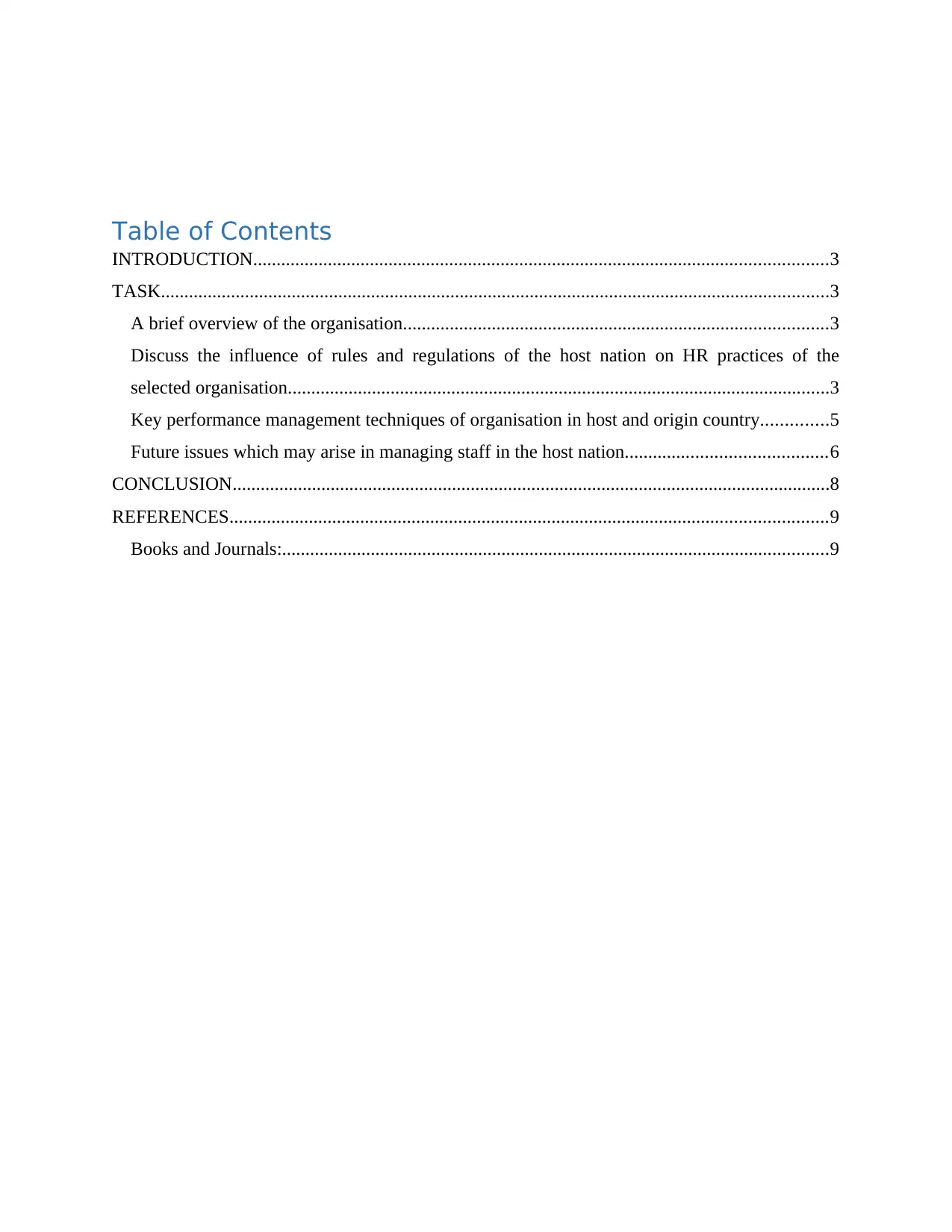
Table of Contents
INTRODUCTION...........................................................................................................................3
TASK...............................................................................................................................................3
A brief overview of the organisation...........................................................................................3
Discuss the influence of rules and regulations of the host nation on HR practices of the
selected organisation....................................................................................................................3
Key performance management techniques of organisation in host and origin country..............5
Future issues which may arise in managing staff in the host nation...........................................6
CONCLUSION................................................................................................................................8
REFERENCES................................................................................................................................9
Books and Journals:.....................................................................................................................9
INTRODUCTION...........................................................................................................................3
TASK...............................................................................................................................................3
A brief overview of the organisation...........................................................................................3
Discuss the influence of rules and regulations of the host nation on HR practices of the
selected organisation....................................................................................................................3
Key performance management techniques of organisation in host and origin country..............5
Future issues which may arise in managing staff in the host nation...........................................6
CONCLUSION................................................................................................................................8
REFERENCES................................................................................................................................9
Books and Journals:.....................................................................................................................9
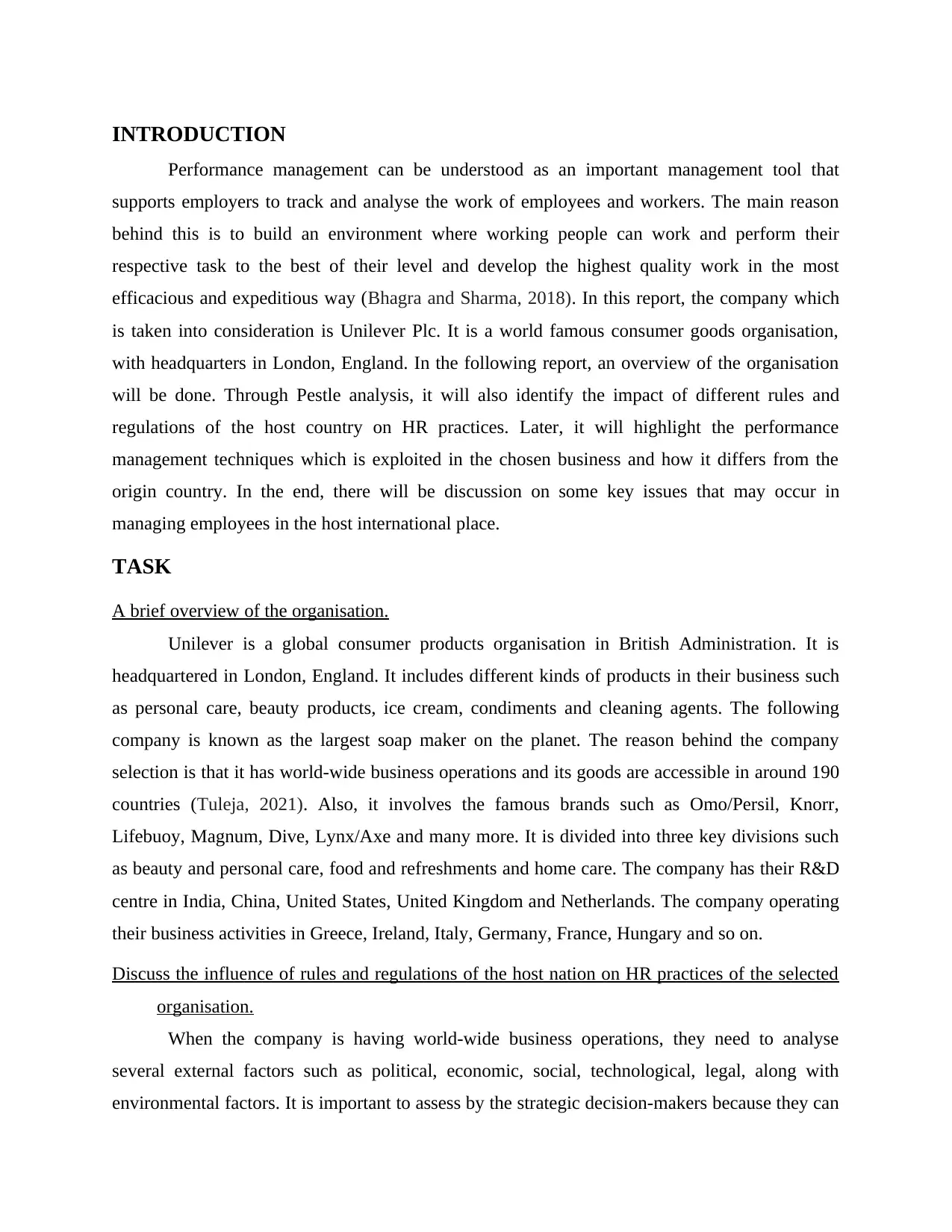
INTRODUCTION
Performance management can be understood as an important management tool that
supports employers to track and analyse the work of employees and workers. The main reason
behind this is to build an environment where working people can work and perform their
respective task to the best of their level and develop the highest quality work in the most
efficacious and expeditious way (Bhagra and Sharma, 2018). In this report, the company which
is taken into consideration is Unilever Plc. It is a world famous consumer goods organisation,
with headquarters in London, England. In the following report, an overview of the organisation
will be done. Through Pestle analysis, it will also identify the impact of different rules and
regulations of the host country on HR practices. Later, it will highlight the performance
management techniques which is exploited in the chosen business and how it differs from the
origin country. In the end, there will be discussion on some key issues that may occur in
managing employees in the host international place.
TASK
A brief overview of the organisation.
Unilever is a global consumer products organisation in British Administration. It is
headquartered in London, England. It includes different kinds of products in their business such
as personal care, beauty products, ice cream, condiments and cleaning agents. The following
company is known as the largest soap maker on the planet. The reason behind the company
selection is that it has world-wide business operations and its goods are accessible in around 190
countries (Tuleja, 2021). Also, it involves the famous brands such as Omo/Persil, Knorr,
Lifebuoy, Magnum, Dive, Lynx/Axe and many more. It is divided into three key divisions such
as beauty and personal care, food and refreshments and home care. The company has their R&D
centre in India, China, United States, United Kingdom and Netherlands. The company operating
their business activities in Greece, Ireland, Italy, Germany, France, Hungary and so on.
Discuss the influence of rules and regulations of the host nation on HR practices of the selected
organisation.
When the company is having world-wide business operations, they need to analyse
several external factors such as political, economic, social, technological, legal, along with
environmental factors. It is important to assess by the strategic decision-makers because they can
Performance management can be understood as an important management tool that
supports employers to track and analyse the work of employees and workers. The main reason
behind this is to build an environment where working people can work and perform their
respective task to the best of their level and develop the highest quality work in the most
efficacious and expeditious way (Bhagra and Sharma, 2018). In this report, the company which
is taken into consideration is Unilever Plc. It is a world famous consumer goods organisation,
with headquarters in London, England. In the following report, an overview of the organisation
will be done. Through Pestle analysis, it will also identify the impact of different rules and
regulations of the host country on HR practices. Later, it will highlight the performance
management techniques which is exploited in the chosen business and how it differs from the
origin country. In the end, there will be discussion on some key issues that may occur in
managing employees in the host international place.
TASK
A brief overview of the organisation.
Unilever is a global consumer products organisation in British Administration. It is
headquartered in London, England. It includes different kinds of products in their business such
as personal care, beauty products, ice cream, condiments and cleaning agents. The following
company is known as the largest soap maker on the planet. The reason behind the company
selection is that it has world-wide business operations and its goods are accessible in around 190
countries (Tuleja, 2021). Also, it involves the famous brands such as Omo/Persil, Knorr,
Lifebuoy, Magnum, Dive, Lynx/Axe and many more. It is divided into three key divisions such
as beauty and personal care, food and refreshments and home care. The company has their R&D
centre in India, China, United States, United Kingdom and Netherlands. The company operating
their business activities in Greece, Ireland, Italy, Germany, France, Hungary and so on.
Discuss the influence of rules and regulations of the host nation on HR practices of the selected
organisation.
When the company is having world-wide business operations, they need to analyse
several external factors such as political, economic, social, technological, legal, along with
environmental factors. It is important to assess by the strategic decision-makers because they can
⊘ This is a preview!⊘
Do you want full access?
Subscribe today to unlock all pages.

Trusted by 1+ million students worldwide
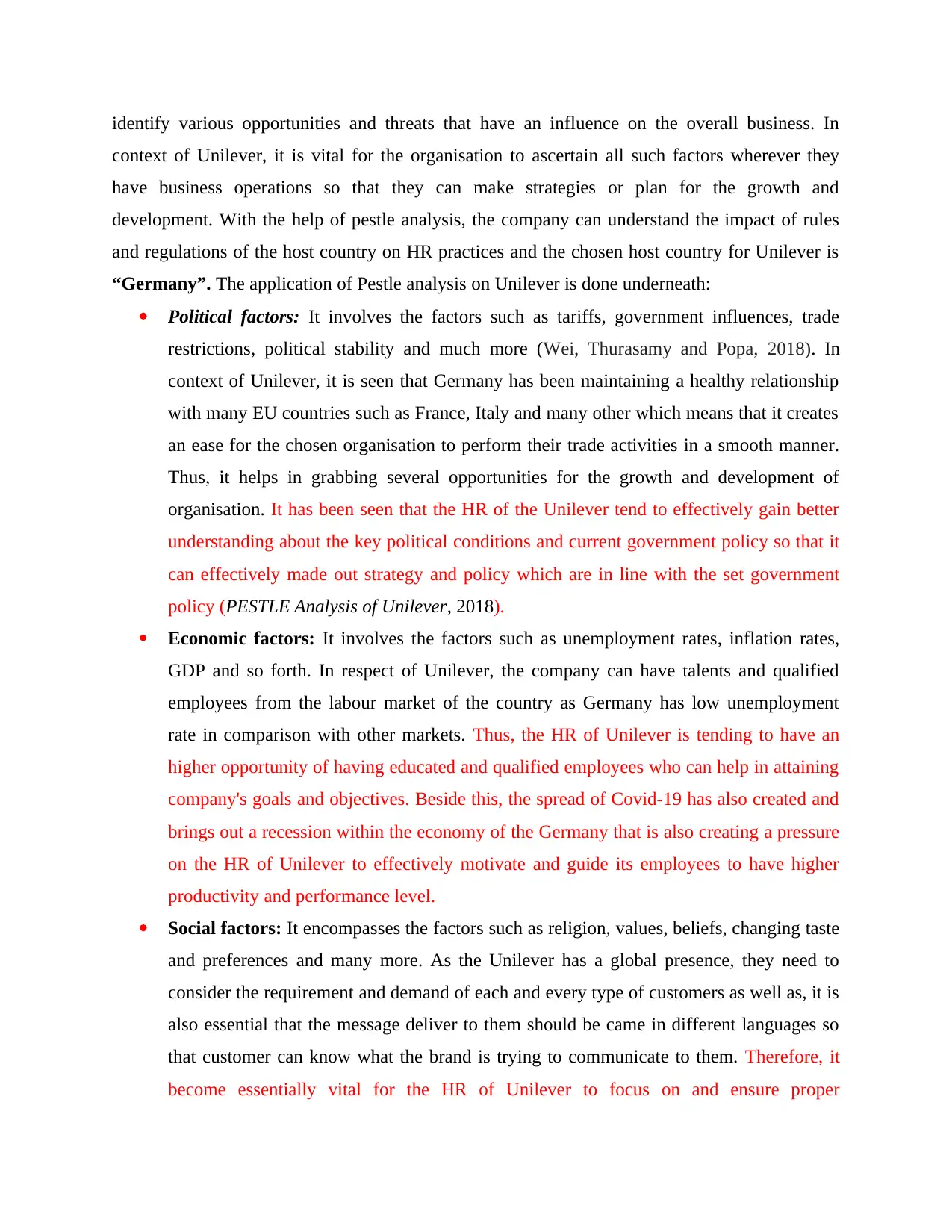
identify various opportunities and threats that have an influence on the overall business. In
context of Unilever, it is vital for the organisation to ascertain all such factors wherever they
have business operations so that they can make strategies or plan for the growth and
development. With the help of pestle analysis, the company can understand the impact of rules
and regulations of the host country on HR practices and the chosen host country for Unilever is
“Germany”. The application of Pestle analysis on Unilever is done underneath:
Political factors: It involves the factors such as tariffs, government influences, trade
restrictions, political stability and much more (Wei, Thurasamy and Popa, 2018). In
context of Unilever, it is seen that Germany has been maintaining a healthy relationship
with many EU countries such as France, Italy and many other which means that it creates
an ease for the chosen organisation to perform their trade activities in a smooth manner.
Thus, it helps in grabbing several opportunities for the growth and development of
organisation. It has been seen that the HR of the Unilever tend to effectively gain better
understanding about the key political conditions and current government policy so that it
can effectively made out strategy and policy which are in line with the set government
policy (PESTLE Analysis of Unilever, 2018).
Economic factors: It involves the factors such as unemployment rates, inflation rates,
GDP and so forth. In respect of Unilever, the company can have talents and qualified
employees from the labour market of the country as Germany has low unemployment
rate in comparison with other markets. Thus, the HR of Unilever is tending to have an
higher opportunity of having educated and qualified employees who can help in attaining
company's goals and objectives. Beside this, the spread of Covid-19 has also created and
brings out a recession within the economy of the Germany that is also creating a pressure
on the HR of Unilever to effectively motivate and guide its employees to have higher
productivity and performance level.
Social factors: It encompasses the factors such as religion, values, beliefs, changing taste
and preferences and many more. As the Unilever has a global presence, they need to
consider the requirement and demand of each and every type of customers as well as, it is
also essential that the message deliver to them should be came in different languages so
that customer can know what the brand is trying to communicate to them. Therefore, it
become essentially vital for the HR of Unilever to focus on and ensure proper
context of Unilever, it is vital for the organisation to ascertain all such factors wherever they
have business operations so that they can make strategies or plan for the growth and
development. With the help of pestle analysis, the company can understand the impact of rules
and regulations of the host country on HR practices and the chosen host country for Unilever is
“Germany”. The application of Pestle analysis on Unilever is done underneath:
Political factors: It involves the factors such as tariffs, government influences, trade
restrictions, political stability and much more (Wei, Thurasamy and Popa, 2018). In
context of Unilever, it is seen that Germany has been maintaining a healthy relationship
with many EU countries such as France, Italy and many other which means that it creates
an ease for the chosen organisation to perform their trade activities in a smooth manner.
Thus, it helps in grabbing several opportunities for the growth and development of
organisation. It has been seen that the HR of the Unilever tend to effectively gain better
understanding about the key political conditions and current government policy so that it
can effectively made out strategy and policy which are in line with the set government
policy (PESTLE Analysis of Unilever, 2018).
Economic factors: It involves the factors such as unemployment rates, inflation rates,
GDP and so forth. In respect of Unilever, the company can have talents and qualified
employees from the labour market of the country as Germany has low unemployment
rate in comparison with other markets. Thus, the HR of Unilever is tending to have an
higher opportunity of having educated and qualified employees who can help in attaining
company's goals and objectives. Beside this, the spread of Covid-19 has also created and
brings out a recession within the economy of the Germany that is also creating a pressure
on the HR of Unilever to effectively motivate and guide its employees to have higher
productivity and performance level.
Social factors: It encompasses the factors such as religion, values, beliefs, changing taste
and preferences and many more. As the Unilever has a global presence, they need to
consider the requirement and demand of each and every type of customers as well as, it is
also essential that the message deliver to them should be came in different languages so
that customer can know what the brand is trying to communicate to them. Therefore, it
become essentially vital for the HR of Unilever to focus on and ensure proper
Paraphrase This Document
Need a fresh take? Get an instant paraphrase of this document with our AI Paraphraser
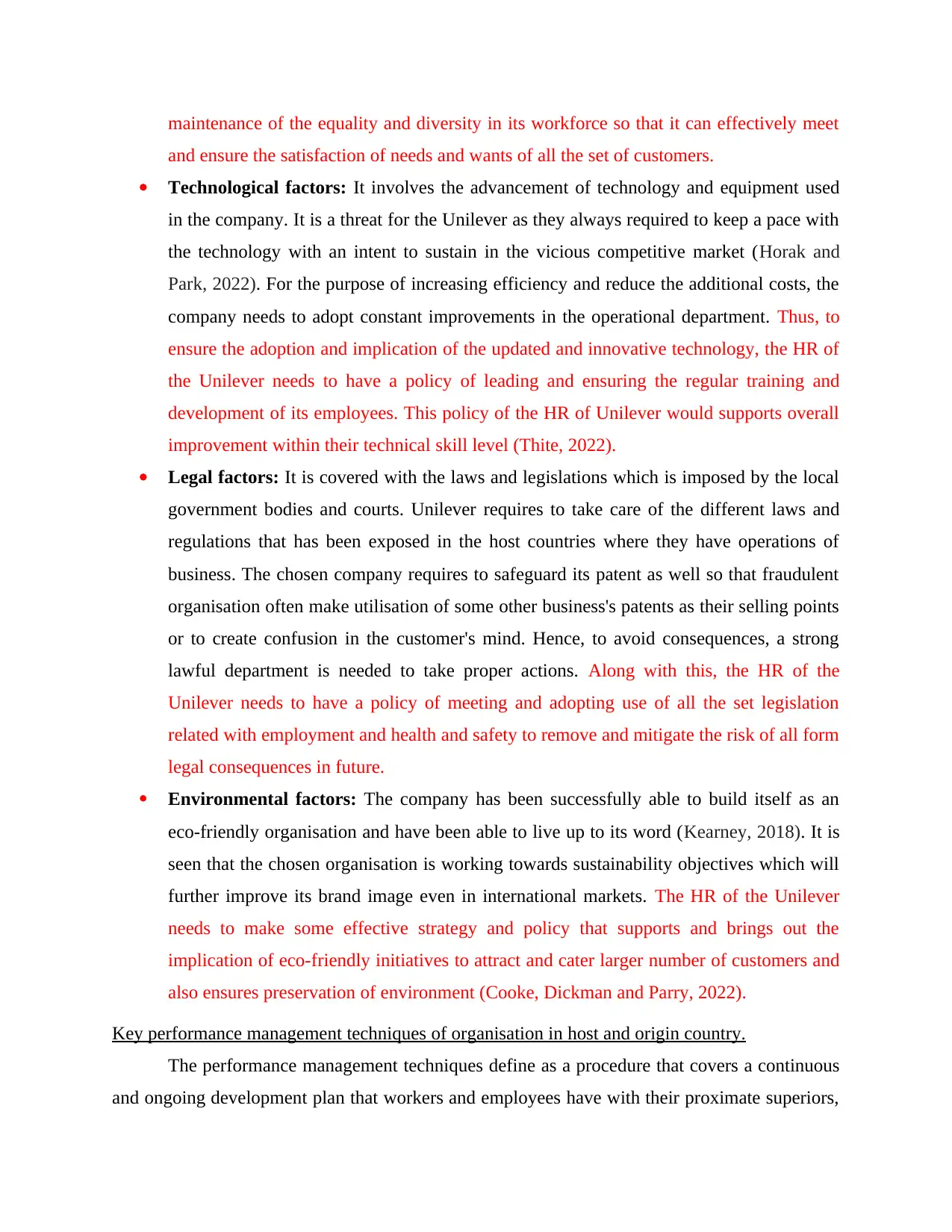
maintenance of the equality and diversity in its workforce so that it can effectively meet
and ensure the satisfaction of needs and wants of all the set of customers.
Technological factors: It involves the advancement of technology and equipment used
in the company. It is a threat for the Unilever as they always required to keep a pace with
the technology with an intent to sustain in the vicious competitive market (Horak and
Park, 2022). For the purpose of increasing efficiency and reduce the additional costs, the
company needs to adopt constant improvements in the operational department. Thus, to
ensure the adoption and implication of the updated and innovative technology, the HR of
the Unilever needs to have a policy of leading and ensuring the regular training and
development of its employees. This policy of the HR of Unilever would supports overall
improvement within their technical skill level (Thite, 2022).
Legal factors: It is covered with the laws and legislations which is imposed by the local
government bodies and courts. Unilever requires to take care of the different laws and
regulations that has been exposed in the host countries where they have operations of
business. The chosen company requires to safeguard its patent as well so that fraudulent
organisation often make utilisation of some other business's patents as their selling points
or to create confusion in the customer's mind. Hence, to avoid consequences, a strong
lawful department is needed to take proper actions. Along with this, the HR of the
Unilever needs to have a policy of meeting and adopting use of all the set legislation
related with employment and health and safety to remove and mitigate the risk of all form
legal consequences in future.
Environmental factors: The company has been successfully able to build itself as an
eco-friendly organisation and have been able to live up to its word (Kearney, 2018). It is
seen that the chosen organisation is working towards sustainability objectives which will
further improve its brand image even in international markets. The HR of the Unilever
needs to make some effective strategy and policy that supports and brings out the
implication of eco-friendly initiatives to attract and cater larger number of customers and
also ensures preservation of environment (Cooke, Dickman and Parry, 2022).
Key performance management techniques of organisation in host and origin country.
The performance management techniques define as a procedure that covers a continuous
and ongoing development plan that workers and employees have with their proximate superiors,
and ensure the satisfaction of needs and wants of all the set of customers.
Technological factors: It involves the advancement of technology and equipment used
in the company. It is a threat for the Unilever as they always required to keep a pace with
the technology with an intent to sustain in the vicious competitive market (Horak and
Park, 2022). For the purpose of increasing efficiency and reduce the additional costs, the
company needs to adopt constant improvements in the operational department. Thus, to
ensure the adoption and implication of the updated and innovative technology, the HR of
the Unilever needs to have a policy of leading and ensuring the regular training and
development of its employees. This policy of the HR of Unilever would supports overall
improvement within their technical skill level (Thite, 2022).
Legal factors: It is covered with the laws and legislations which is imposed by the local
government bodies and courts. Unilever requires to take care of the different laws and
regulations that has been exposed in the host countries where they have operations of
business. The chosen company requires to safeguard its patent as well so that fraudulent
organisation often make utilisation of some other business's patents as their selling points
or to create confusion in the customer's mind. Hence, to avoid consequences, a strong
lawful department is needed to take proper actions. Along with this, the HR of the
Unilever needs to have a policy of meeting and adopting use of all the set legislation
related with employment and health and safety to remove and mitigate the risk of all form
legal consequences in future.
Environmental factors: The company has been successfully able to build itself as an
eco-friendly organisation and have been able to live up to its word (Kearney, 2018). It is
seen that the chosen organisation is working towards sustainability objectives which will
further improve its brand image even in international markets. The HR of the Unilever
needs to make some effective strategy and policy that supports and brings out the
implication of eco-friendly initiatives to attract and cater larger number of customers and
also ensures preservation of environment (Cooke, Dickman and Parry, 2022).
Key performance management techniques of organisation in host and origin country.
The performance management techniques define as a procedure that covers a continuous
and ongoing development plan that workers and employees have with their proximate superiors,
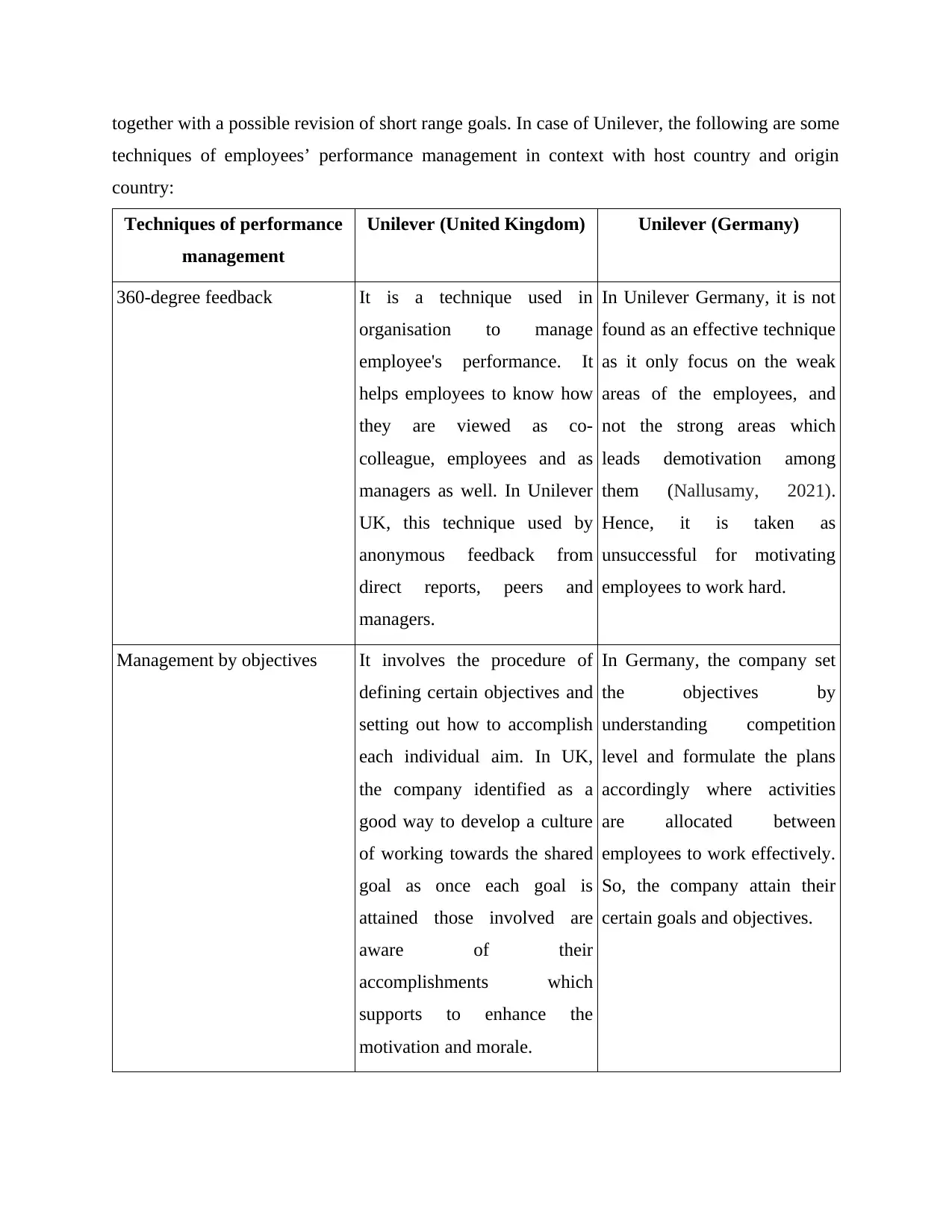
together with a possible revision of short range goals. In case of Unilever, the following are some
techniques of employees’ performance management in context with host country and origin
country:
Techniques of performance
management
Unilever (United Kingdom) Unilever (Germany)
360-degree feedback It is a technique used in
organisation to manage
employee's performance. It
helps employees to know how
they are viewed as co-
colleague, employees and as
managers as well. In Unilever
UK, this technique used by
anonymous feedback from
direct reports, peers and
managers.
In Unilever Germany, it is not
found as an effective technique
as it only focus on the weak
areas of the employees, and
not the strong areas which
leads demotivation among
them (Nallusamy, 2021).
Hence, it is taken as
unsuccessful for motivating
employees to work hard.
Management by objectives It involves the procedure of
defining certain objectives and
setting out how to accomplish
each individual aim. In UK,
the company identified as a
good way to develop a culture
of working towards the shared
goal as once each goal is
attained those involved are
aware of their
accomplishments which
supports to enhance the
motivation and morale.
In Germany, the company set
the objectives by
understanding competition
level and formulate the plans
accordingly where activities
are allocated between
employees to work effectively.
So, the company attain their
certain goals and objectives.
techniques of employees’ performance management in context with host country and origin
country:
Techniques of performance
management
Unilever (United Kingdom) Unilever (Germany)
360-degree feedback It is a technique used in
organisation to manage
employee's performance. It
helps employees to know how
they are viewed as co-
colleague, employees and as
managers as well. In Unilever
UK, this technique used by
anonymous feedback from
direct reports, peers and
managers.
In Unilever Germany, it is not
found as an effective technique
as it only focus on the weak
areas of the employees, and
not the strong areas which
leads demotivation among
them (Nallusamy, 2021).
Hence, it is taken as
unsuccessful for motivating
employees to work hard.
Management by objectives It involves the procedure of
defining certain objectives and
setting out how to accomplish
each individual aim. In UK,
the company identified as a
good way to develop a culture
of working towards the shared
goal as once each goal is
attained those involved are
aware of their
accomplishments which
supports to enhance the
motivation and morale.
In Germany, the company set
the objectives by
understanding competition
level and formulate the plans
accordingly where activities
are allocated between
employees to work effectively.
So, the company attain their
certain goals and objectives.
⊘ This is a preview!⊘
Do you want full access?
Subscribe today to unlock all pages.

Trusted by 1+ million students worldwide
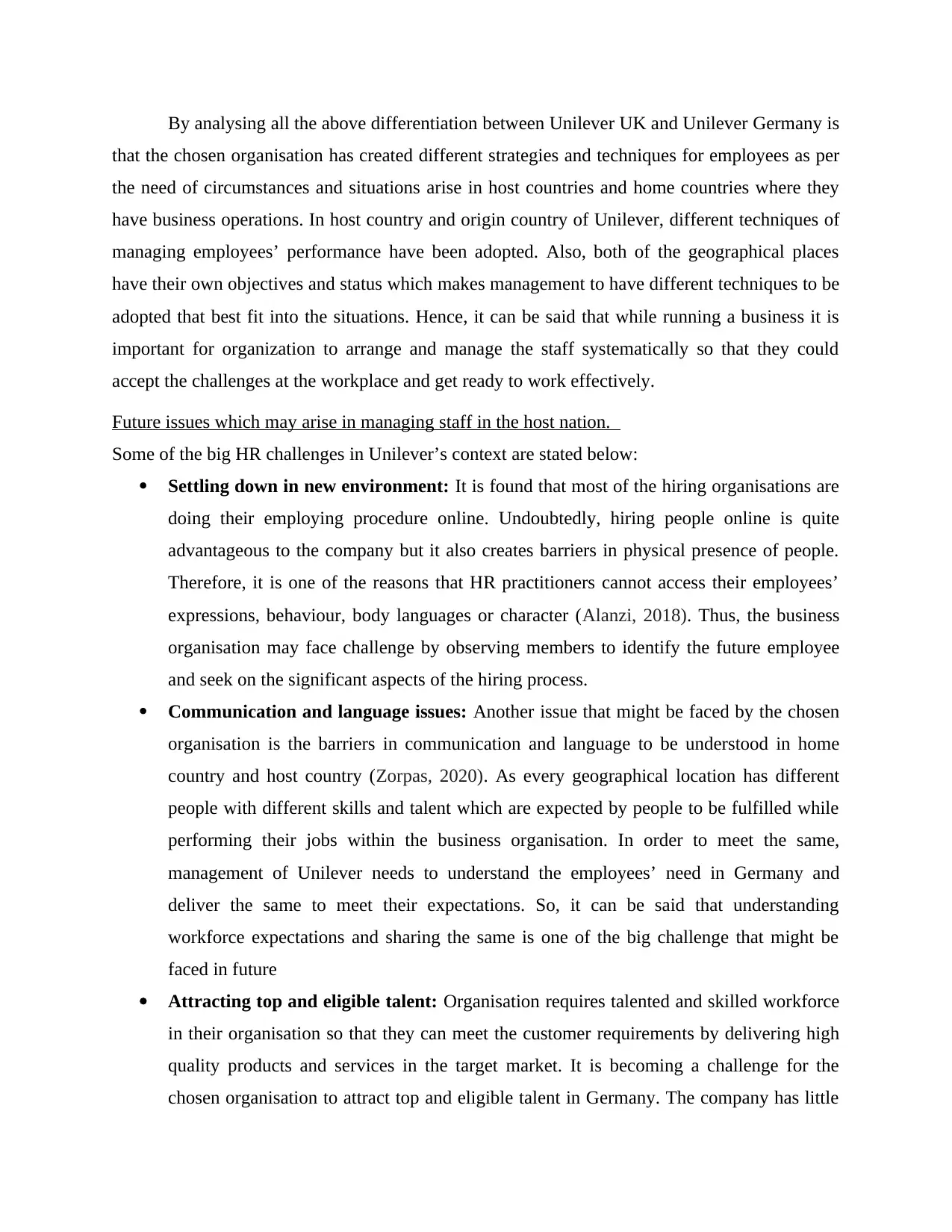
By analysing all the above differentiation between Unilever UK and Unilever Germany is
that the chosen organisation has created different strategies and techniques for employees as per
the need of circumstances and situations arise in host countries and home countries where they
have business operations. In host country and origin country of Unilever, different techniques of
managing employees’ performance have been adopted. Also, both of the geographical places
have their own objectives and status which makes management to have different techniques to be
adopted that best fit into the situations. Hence, it can be said that while running a business it is
important for organization to arrange and manage the staff systematically so that they could
accept the challenges at the workplace and get ready to work effectively.
Future issues which may arise in managing staff in the host nation.
Some of the big HR challenges in Unilever’s context are stated below:
Settling down in new environment: It is found that most of the hiring organisations are
doing their employing procedure online. Undoubtedly, hiring people online is quite
advantageous to the company but it also creates barriers in physical presence of people.
Therefore, it is one of the reasons that HR practitioners cannot access their employees’
expressions, behaviour, body languages or character (Alanzi, 2018). Thus, the business
organisation may face challenge by observing members to identify the future employee
and seek on the significant aspects of the hiring process.
Communication and language issues: Another issue that might be faced by the chosen
organisation is the barriers in communication and language to be understood in home
country and host country (Zorpas, 2020). As every geographical location has different
people with different skills and talent which are expected by people to be fulfilled while
performing their jobs within the business organisation. In order to meet the same,
management of Unilever needs to understand the employees’ need in Germany and
deliver the same to meet their expectations. So, it can be said that understanding
workforce expectations and sharing the same is one of the big challenge that might be
faced in future
Attracting top and eligible talent: Organisation requires talented and skilled workforce
in their organisation so that they can meet the customer requirements by delivering high
quality products and services in the target market. It is becoming a challenge for the
chosen organisation to attract top and eligible talent in Germany. The company has little
that the chosen organisation has created different strategies and techniques for employees as per
the need of circumstances and situations arise in host countries and home countries where they
have business operations. In host country and origin country of Unilever, different techniques of
managing employees’ performance have been adopted. Also, both of the geographical places
have their own objectives and status which makes management to have different techniques to be
adopted that best fit into the situations. Hence, it can be said that while running a business it is
important for organization to arrange and manage the staff systematically so that they could
accept the challenges at the workplace and get ready to work effectively.
Future issues which may arise in managing staff in the host nation.
Some of the big HR challenges in Unilever’s context are stated below:
Settling down in new environment: It is found that most of the hiring organisations are
doing their employing procedure online. Undoubtedly, hiring people online is quite
advantageous to the company but it also creates barriers in physical presence of people.
Therefore, it is one of the reasons that HR practitioners cannot access their employees’
expressions, behaviour, body languages or character (Alanzi, 2018). Thus, the business
organisation may face challenge by observing members to identify the future employee
and seek on the significant aspects of the hiring process.
Communication and language issues: Another issue that might be faced by the chosen
organisation is the barriers in communication and language to be understood in home
country and host country (Zorpas, 2020). As every geographical location has different
people with different skills and talent which are expected by people to be fulfilled while
performing their jobs within the business organisation. In order to meet the same,
management of Unilever needs to understand the employees’ need in Germany and
deliver the same to meet their expectations. So, it can be said that understanding
workforce expectations and sharing the same is one of the big challenge that might be
faced in future
Attracting top and eligible talent: Organisation requires talented and skilled workforce
in their organisation so that they can meet the customer requirements by delivering high
quality products and services in the target market. It is becoming a challenge for the
chosen organisation to attract top and eligible talent in Germany. The company has little
Paraphrase This Document
Need a fresh take? Get an instant paraphrase of this document with our AI Paraphraser
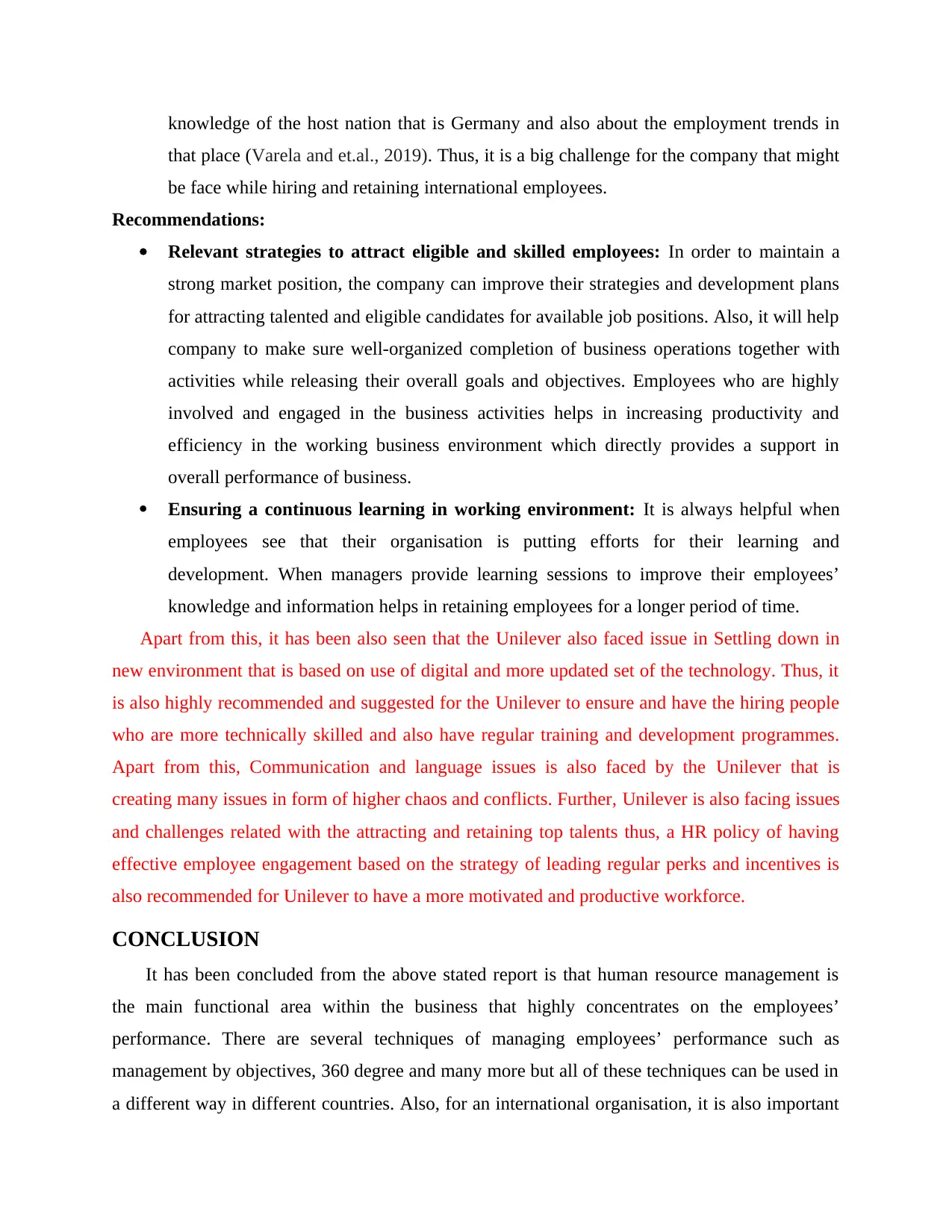
knowledge of the host nation that is Germany and also about the employment trends in
that place (Varela and et.al., 2019). Thus, it is a big challenge for the company that might
be face while hiring and retaining international employees.
Recommendations:
Relevant strategies to attract eligible and skilled employees: In order to maintain a
strong market position, the company can improve their strategies and development plans
for attracting talented and eligible candidates for available job positions. Also, it will help
company to make sure well-organized completion of business operations together with
activities while releasing their overall goals and objectives. Employees who are highly
involved and engaged in the business activities helps in increasing productivity and
efficiency in the working business environment which directly provides a support in
overall performance of business.
Ensuring a continuous learning in working environment: It is always helpful when
employees see that their organisation is putting efforts for their learning and
development. When managers provide learning sessions to improve their employees’
knowledge and information helps in retaining employees for a longer period of time.
Apart from this, it has been also seen that the Unilever also faced issue in Settling down in
new environment that is based on use of digital and more updated set of the technology. Thus, it
is also highly recommended and suggested for the Unilever to ensure and have the hiring people
who are more technically skilled and also have regular training and development programmes.
Apart from this, Communication and language issues is also faced by the Unilever that is
creating many issues in form of higher chaos and conflicts. Further, Unilever is also facing issues
and challenges related with the attracting and retaining top talents thus, a HR policy of having
effective employee engagement based on the strategy of leading regular perks and incentives is
also recommended for Unilever to have a more motivated and productive workforce.
CONCLUSION
It has been concluded from the above stated report is that human resource management is
the main functional area within the business that highly concentrates on the employees’
performance. There are several techniques of managing employees’ performance such as
management by objectives, 360 degree and many more but all of these techniques can be used in
a different way in different countries. Also, for an international organisation, it is also important
that place (Varela and et.al., 2019). Thus, it is a big challenge for the company that might
be face while hiring and retaining international employees.
Recommendations:
Relevant strategies to attract eligible and skilled employees: In order to maintain a
strong market position, the company can improve their strategies and development plans
for attracting talented and eligible candidates for available job positions. Also, it will help
company to make sure well-organized completion of business operations together with
activities while releasing their overall goals and objectives. Employees who are highly
involved and engaged in the business activities helps in increasing productivity and
efficiency in the working business environment which directly provides a support in
overall performance of business.
Ensuring a continuous learning in working environment: It is always helpful when
employees see that their organisation is putting efforts for their learning and
development. When managers provide learning sessions to improve their employees’
knowledge and information helps in retaining employees for a longer period of time.
Apart from this, it has been also seen that the Unilever also faced issue in Settling down in
new environment that is based on use of digital and more updated set of the technology. Thus, it
is also highly recommended and suggested for the Unilever to ensure and have the hiring people
who are more technically skilled and also have regular training and development programmes.
Apart from this, Communication and language issues is also faced by the Unilever that is
creating many issues in form of higher chaos and conflicts. Further, Unilever is also facing issues
and challenges related with the attracting and retaining top talents thus, a HR policy of having
effective employee engagement based on the strategy of leading regular perks and incentives is
also recommended for Unilever to have a more motivated and productive workforce.
CONCLUSION
It has been concluded from the above stated report is that human resource management is
the main functional area within the business that highly concentrates on the employees’
performance. There are several techniques of managing employees’ performance such as
management by objectives, 360 degree and many more but all of these techniques can be used in
a different way in different countries. Also, for an international organisation, it is also important
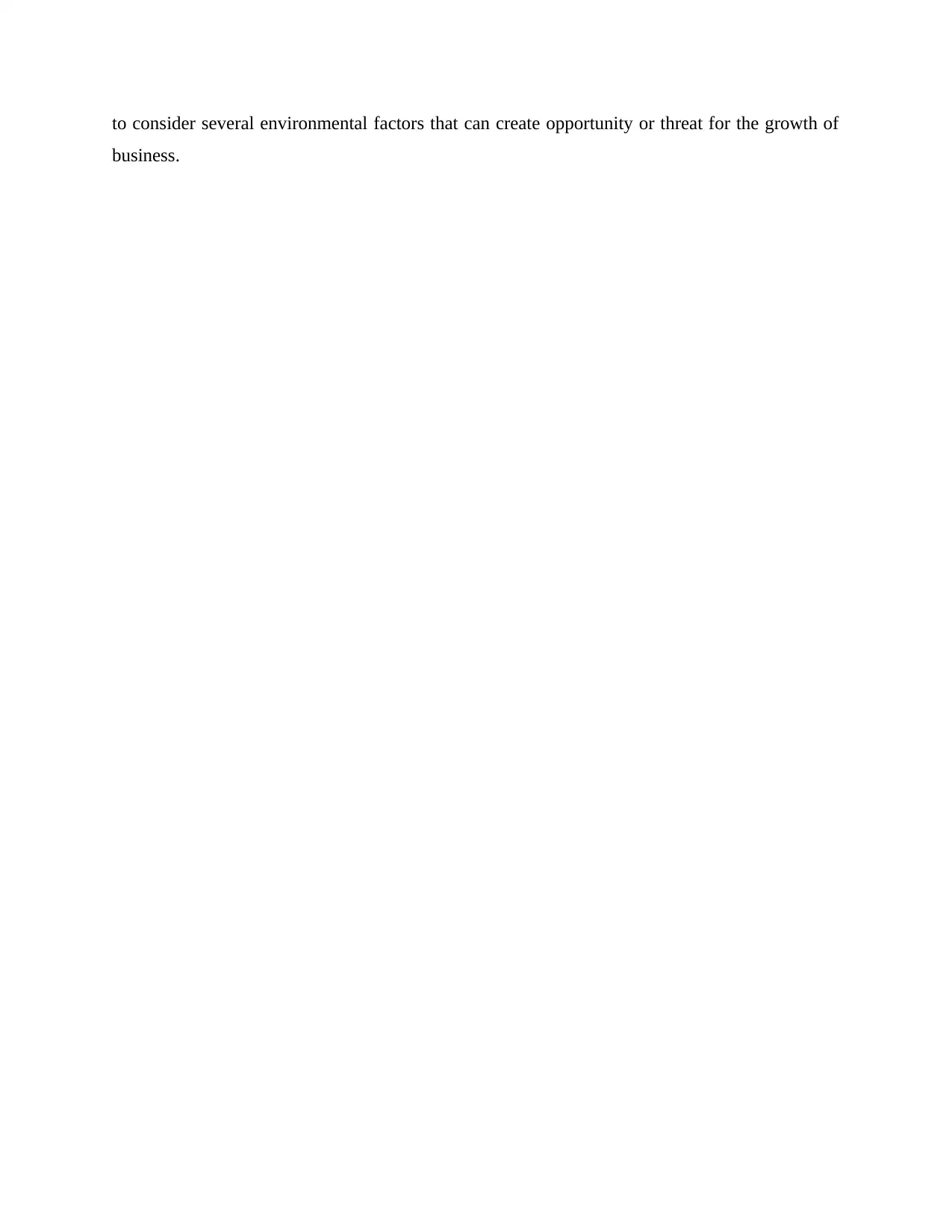
to consider several environmental factors that can create opportunity or threat for the growth of
business.
business.
⊘ This is a preview!⊘
Do you want full access?
Subscribe today to unlock all pages.

Trusted by 1+ million students worldwide
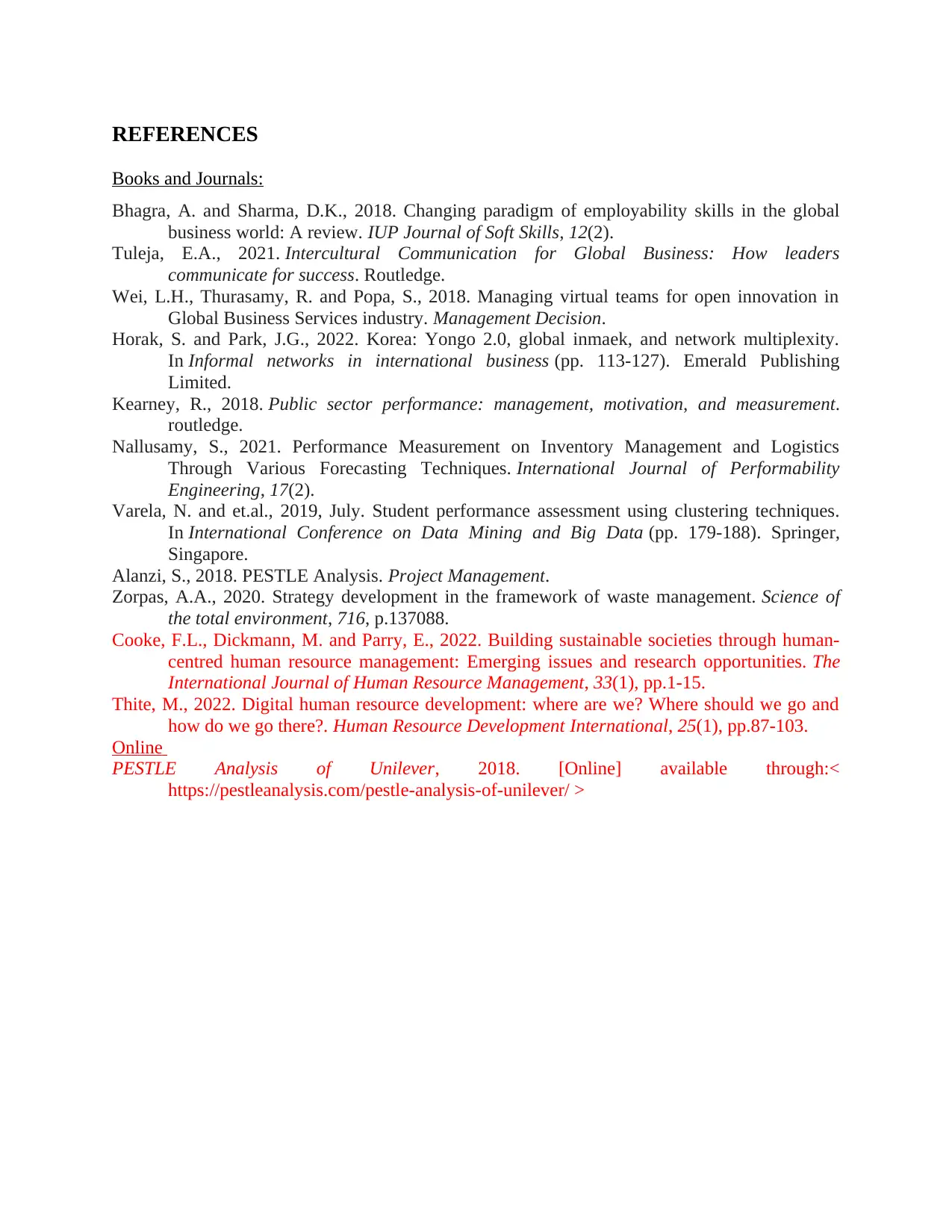
REFERENCES
Books and Journals:
Bhagra, A. and Sharma, D.K., 2018. Changing paradigm of employability skills in the global
business world: A review. IUP Journal of Soft Skills, 12(2).
Tuleja, E.A., 2021. Intercultural Communication for Global Business: How leaders
communicate for success. Routledge.
Wei, L.H., Thurasamy, R. and Popa, S., 2018. Managing virtual teams for open innovation in
Global Business Services industry. Management Decision.
Horak, S. and Park, J.G., 2022. Korea: Yongo 2.0, global inmaek, and network multiplexity.
In Informal networks in international business (pp. 113-127). Emerald Publishing
Limited.
Kearney, R., 2018. Public sector performance: management, motivation, and measurement.
routledge.
Nallusamy, S., 2021. Performance Measurement on Inventory Management and Logistics
Through Various Forecasting Techniques. International Journal of Performability
Engineering, 17(2).
Varela, N. and et.al., 2019, July. Student performance assessment using clustering techniques.
In International Conference on Data Mining and Big Data (pp. 179-188). Springer,
Singapore.
Alanzi, S., 2018. PESTLE Analysis. Project Management.
Zorpas, A.A., 2020. Strategy development in the framework of waste management. Science of
the total environment, 716, p.137088.
Cooke, F.L., Dickmann, M. and Parry, E., 2022. Building sustainable societies through human-
centred human resource management: Emerging issues and research opportunities. The
International Journal of Human Resource Management, 33(1), pp.1-15.
Thite, M., 2022. Digital human resource development: where are we? Where should we go and
how do we go there?. Human Resource Development International, 25(1), pp.87-103.
Online
PESTLE Analysis of Unilever, 2018. [Online] available through:<
https://pestleanalysis.com/pestle-analysis-of-unilever/ >
Books and Journals:
Bhagra, A. and Sharma, D.K., 2018. Changing paradigm of employability skills in the global
business world: A review. IUP Journal of Soft Skills, 12(2).
Tuleja, E.A., 2021. Intercultural Communication for Global Business: How leaders
communicate for success. Routledge.
Wei, L.H., Thurasamy, R. and Popa, S., 2018. Managing virtual teams for open innovation in
Global Business Services industry. Management Decision.
Horak, S. and Park, J.G., 2022. Korea: Yongo 2.0, global inmaek, and network multiplexity.
In Informal networks in international business (pp. 113-127). Emerald Publishing
Limited.
Kearney, R., 2018. Public sector performance: management, motivation, and measurement.
routledge.
Nallusamy, S., 2021. Performance Measurement on Inventory Management and Logistics
Through Various Forecasting Techniques. International Journal of Performability
Engineering, 17(2).
Varela, N. and et.al., 2019, July. Student performance assessment using clustering techniques.
In International Conference on Data Mining and Big Data (pp. 179-188). Springer,
Singapore.
Alanzi, S., 2018. PESTLE Analysis. Project Management.
Zorpas, A.A., 2020. Strategy development in the framework of waste management. Science of
the total environment, 716, p.137088.
Cooke, F.L., Dickmann, M. and Parry, E., 2022. Building sustainable societies through human-
centred human resource management: Emerging issues and research opportunities. The
International Journal of Human Resource Management, 33(1), pp.1-15.
Thite, M., 2022. Digital human resource development: where are we? Where should we go and
how do we go there?. Human Resource Development International, 25(1), pp.87-103.
Online
PESTLE Analysis of Unilever, 2018. [Online] available through:<
https://pestleanalysis.com/pestle-analysis-of-unilever/ >
1 out of 10
Related Documents
Your All-in-One AI-Powered Toolkit for Academic Success.
+13062052269
info@desklib.com
Available 24*7 on WhatsApp / Email
![[object Object]](/_next/static/media/star-bottom.7253800d.svg)
Unlock your academic potential
Copyright © 2020–2025 A2Z Services. All Rights Reserved. Developed and managed by ZUCOL.




